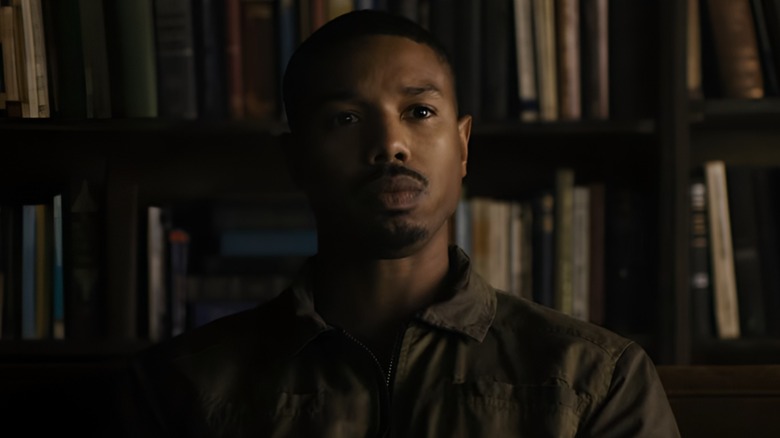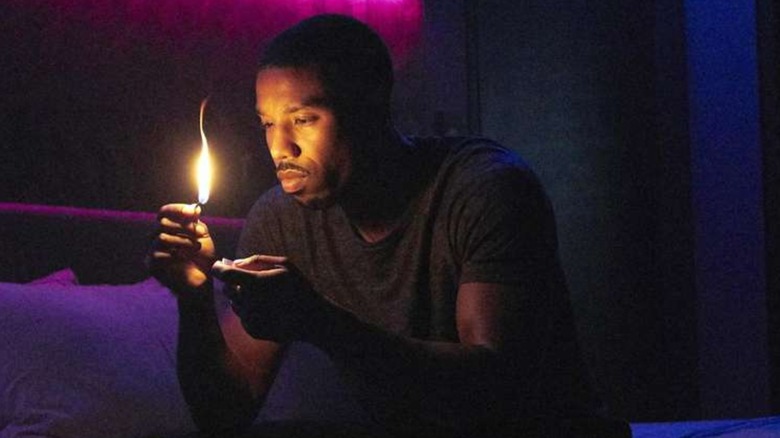Michael B. Jordan Was The Best Part Of HBO's Worst Sci-Fi Movie
"There must be something in books, something we can't imagine, to make a woman stay in a burning house; there must be something there. You don't stay for nothing."
These words from Ray Bradbury's fiery, prophetic "Fahrenheit 451" underline our innate connection with literature and how instinctual it is to want to protect such artistic legacies. In this 1953 book, Bradbury's America is a dystopian one, where all books are outlawed and burned by firemen, who exist to eradicate any ideas that are deemed dangerous by an authoritarian state. One such fireman, Guy Montag, gradually realizes that book burning cannot exist in a vacuum — it is an act that actively enforces censorship and infringes upon individual and collective freedom. Distressed and disillusioned by his contribution to such a ghoulish practice, Guy quits his job and decides to do everything in his power to preserve books and the precious literary worlds they contain. But the path ahead of him is dangerous and unpredictable, as people around him seem content with the state of the world, and are gleefully complacent with doing what they're told.
"Fahrenheit 451" also draws a connection between the increasing disdain for books and shorter attention spans, where authoritarian states use technology to control mass media and shape public opinion. Bradbury's book also predicts technological gadgets that are commonplace today (everything from massive flat-panel televisions to wireless earphones), although they are framed as distractions created to discourage the masses from engaging in critical thought. Considering how ban-happy some parts of the world are, especially when it comes to fiction (an example being the constant, arbitrary banning of Stephen King books in school libraries), "Fahrenheit 451" feels more like a prophetic warning than speculative fiction. It anticipates our obsession with our screens and a societal bent towards whatever demands the shortest attention spans.
When Ramin Bahrani (who helmed the underrated 2013 drama, "At Any Price") decided to adapt "Fahrenheit 451" for HBO, he knew that retelling such a powerful story would prove to be tricky. Bahrani noted that we already live in the world that Bradbury cautions us against, where virtual realities (including social media) often take precedence over solitary pursuits like reading books. However, book reading has also been commodified at the same time, as it has been redefined as a status symbol or a marker of rampant consumerism on certain corners of the internet. In a column for The New York Times, Bahrani wrote that "owning books becomes an act of rebellion," as it is impossible not to engage with digital media that wants to snuff out critical thinking (as we're digitally overstimulated at all times).
Regrettably, this nuanced perspective does not carry over to the HBO adaptation, as Bahrani's "Fahrenheit 451" fizzles. Although there is one bright spot: Michael B. Jordan, who stars alongside Michael Shannon.
HBO's Fahrenheit 451 fails to incorporate the scathing edge of Bradbury's novel
In Bahrani's adaptation, Guy (Michael B. Jordan) is more brash and flashy than his literary counterpart. For starters, his job as a fireman is more celebrated than you would think, and these state-mandated book burners are lauded as heroes, their faces plastered on massive billboards. Most of these firemen have never seen a book, so they handle and sniff these seemingly outdated cultural artifacts with a sense of caution and awe. Burying this curiosity deep within, they grit their teeth and set the books ablaze.
But Bahrani does not linger on these subtle moments — instead, he leverages Jordan's tendency to shine in action-heavy sequences, and turns a chunk of the story into bite-sized kinetic moments. This inevitably delays Guy's eye-opening transformation, as it is difficult for him to disentangle himself from state propaganda. However, a meeting with Clarisse (Sofia Boutella) accelerates this to an extent, as he is suddenly privy to a hidden world of forbidden knowledge and artistic wonders.
The primary issue with this version of the story is that it has been told many times, often in infinitely better ways. François Truffaut's 1966 adaptation of the book is sharp, witty, and masterfully crafted, and is perhaps one of the best interpretations of Bradbury's novel. Even films that have been indirectly influenced by "Fahrenheit 451" have embraced a distinct identity that Bahrani's version lacks. An example that comes to mind is "Equilibrium," in which Christian Bale's Preston undergoes a disorienting transformation just like Guy, while devoting himself to art, beauty, and the eradication of a totalitarian regime. With so many stories already fleshing out Bradbury's ethos with startling complexity, HBO's "Fahrenheit 451" feels almost juvenile, as its central ideas are shallower than they initially seem.
Jordan injects the film with refreshing dynamism even when the script falters, as his character's machismo feels authentic even though Bradbury's Guy has never embraced such an outwardly assertive identity. There's also a pedantic undercurrent to the events, thankfully dispersed by Michael Shannon's John Beatty, who is delightfully intense and theatrical in a story that starts to sag real quick. Nevertheless, "Fahrenheit 451" relies a bit too heavily on slick visuals, preoccupied with looking cool and sounding profound (with nothing to show for it). If anything, this HBO adaptation douses every aspect that makes Bradbury's book so timeless.

